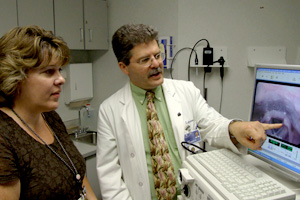Feature Story
As published in the UConn Advance, July 21, 2008.
Health Center Clinic Specializes in Voice Disorders
By Maureen McGuire

Speech pathologist Janet Rovalino and Dr. Denis Lafreniere of the Health Center’s Voice and Speech Clinic, review a video image of a patient’s vocal cords. The clinic offers state-of-the-art care to diagnose and treat voice problems.
Photo by Chris DeFrancesco
Experts with the Health Center’s Voice and Speech Clinic have helped high-profile professional singers, actors, and broadcasters, as well as teachers, lawyers, ministers, and others get their voices back after struggling with chronic hoarseness and other problems.
“There are different levels of voice use, but no matter who you are or what you do for a living, voice is important at every level. It’s something we can easily take for granted until problems occur,” says Dr. Denis Lafreniere, an otolaryngologist – ear, nose and throat expert – and head and neck surgeon, who has led the Voice and Speech Clinic since its inception in 1993.
Lafreniere, who is also chief of the division of Ear, Nose and Throat services at the Health Center, started the Voice and Speech Clinic with Starr Cookman, a voice and speech pathologist and professional singer.
Because of its comprehensive, multidisciplinary approach, the clinic remains the only one of its kind in the region.
Along with Lafreniere and Cookman, the team now includes Patricia Doyle and Janet Rovalino, who are also voice-trained speech pathologists.
Patients benefit from the expertise of two disciplines. The speech pathologists carefully analyze the functional realm of each patient’s voice and Lafreniere focuses on the contributing medical factors.
Seeking Care
Signs and symptoms of voice disorders include hoarseness that lasts
several weeks; persistent throat pain – when throat feels raw, achy
or strained for several weeks; unusual changes in voice, such as the
inability to hit certain high notes when singing; and sounding like
you have a cold or cough when you don’t.
Voice disorders, Lafreniere explains, fall into three categories: neurological, anatomic, and functional.
Neurological disorders result from damage to the central or peripheral nervous system, such as strokes or Parkinson’s disease – it’s estimated that 80 percent of patients with Parkinson’s disease experience voice disorders.
Anatomic problems are caused by physical problems, such as allergies, polyps (small growths) on the larynx, or the reflux of gastric juices. Functional disorders develop when people get into the habit of using the voice abnormally, for example, while suffering from a cold that causes laryngitis.
Diagnoses and individualized treatment plans are made after patients are evaluated by speech analysis computer software and/or videostroboscopy.
These sophisticated technologies visualize, measure, and record vocal cord vibrations and movements. They can reveal a wide range of problems, such as nodules or polyps on the vocal cords.
The treatment plan may consist of speech therapy, surgery, or a combination of these approaches.
A high percentage of vocal nodules can be resolved with speech therapy administered by a voice-trained speech pathologist, Lafreniere says.
Surgical procedures, including minimally invasive options, are also very successful to restore normal function to vocal cords.
“The results can be dramatic. We’ve videotaped patients before and after surgery or treatment, and the improvements are astonishing,” Lafreniere says.
“Our goal is to get people back to what they were doing.”
Experts with the Voice and Speech Clinic offer the following advice for preserving one’s voice:
Drink plenty of fluids: Vocal tissues are easily dehydrated. To prevent dehydration, drink plenty of liquids, especially water. Caffeine and alcohol dehydrate tissues, so increase your water intake if you drink them. Maintaining proper humidity in the home is also helpful.
Avoid airborne irritants: Smoke is irritating to the throat and vocal tissues. It can cause hoarseness and other changes in the quality of the voice and can lead to tissue changes, including cancerous growths on the vocal cords that require medical or surgical treatment.
Avoid vocal abuse and misuse: Yelling, screaming, speaking at too low a pitch, and speaking or singing too loudly or for too long can result in problems such as inflammation and swelling of the vocal cords.
Treat reflux: Esophageal reflux is the regurgitation of stomach juices into the esophagus and throat. Smoking, alcohol use, and caffeine intake contribute to reflux. Common symptoms include heartburn or persistent hoarseness. Reflux irritates the larynx and can lead to coughing, burning, excess mucous, and throat clearing. Over time, it can cause ulcers on the vocal cords.
Take vocal naps: Rest your voice for 15-minute intervals several times during the day, particularly if you use your voice often.


